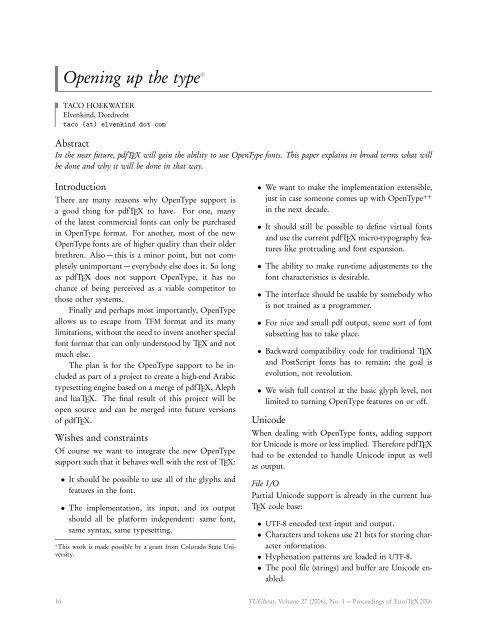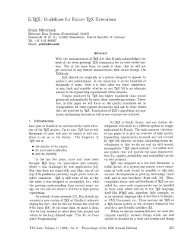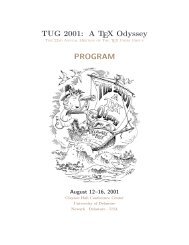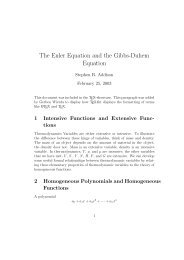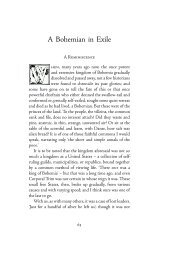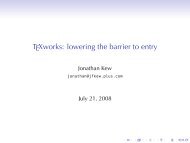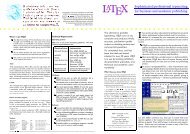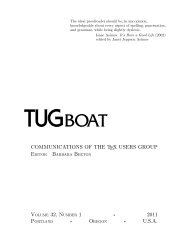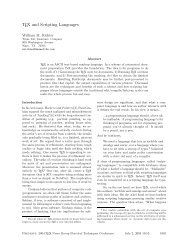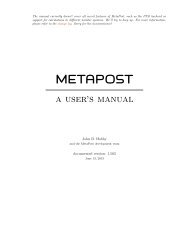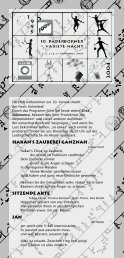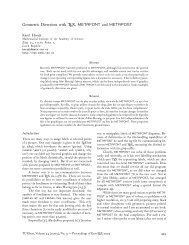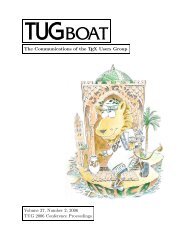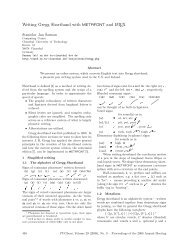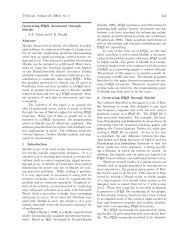The Communications of the TEX Users Group Volume 27 ... - TUG
The Communications of the TEX Users Group Volume 27 ... - TUG
The Communications of the TEX Users Group Volume 27 ... - TUG
You also want an ePaper? Increase the reach of your titles
YUMPU automatically turns print PDFs into web optimized ePapers that Google loves.
Opening up <strong>the</strong> type ∗<br />
TACO HOEKWATER<br />
Elvenkind, Dordrecht<br />
taco (at) elvenkind dot com<br />
Abstract<br />
In <strong>the</strong> near future, pdf<strong>TEX</strong> will gain <strong>the</strong> ability to use OpenType fonts. This paper explains in broad terms what will<br />
be done and why it will be done in that way.<br />
Introduction<br />
<strong>The</strong>re are many reasons why OpenType support is<br />
a good thing for pdf<strong>TEX</strong> to have. For one, many<br />
<strong>of</strong> <strong>the</strong> latest commercial fonts can only be purchased<br />
in OpenType format. For ano<strong>the</strong>r, most <strong>of</strong> <strong>the</strong> new<br />
OpenType fonts are <strong>of</strong> higher quality than <strong>the</strong>ir older<br />
brethren. Also — this is a minor point, but not completely<br />
unimportant — everybody else does it. So long<br />
as pdf<strong>TEX</strong> does not support OpenType, it has no<br />
chance <strong>of</strong> being perceived as a viable competitor to<br />
those o<strong>the</strong>r systems.<br />
Finally and perhaps most importantly, OpenType<br />
allows us to escape from TFM format and its many<br />
limitations, without <strong>the</strong> need to invent ano<strong>the</strong>r special<br />
font format that can only understood by <strong>TEX</strong> and not<br />
much else.<br />
<strong>The</strong> plan is for <strong>the</strong> OpenType support to be included<br />
as part <strong>of</strong> a project to create a high-end Arabic<br />
typesetting engine based on a merge <strong>of</strong> pdf<strong>TEX</strong>, Aleph<br />
and lua<strong>TEX</strong>. <strong>The</strong> final result <strong>of</strong> this project will be<br />
open source and can be merged into future versions<br />
<strong>of</strong> pdf<strong>TEX</strong>.<br />
Wishes and constraints<br />
Of course we want to integrate <strong>the</strong> new OpenType<br />
support such that it behaves well with <strong>the</strong> rest <strong>of</strong> <strong>TEX</strong>:<br />
• It should be possible to use all <strong>of</strong> <strong>the</strong> glyphs and<br />
features in <strong>the</strong> font.<br />
• <strong>The</strong> implementation, its input, and its output<br />
should all be platform independent: same font,<br />
same syntax, same typesetting.<br />
∗ This work is made possible by a grant from Colorado State Uni-<br />
versity.<br />
• We want to make <strong>the</strong> implementation extensible,<br />
just in case someone comes up with OpenType ++<br />
in <strong>the</strong> next decade.<br />
• It should still be possible to define virtual fonts<br />
and use <strong>the</strong> current pdf<strong>TEX</strong> micro-typography features<br />
like protruding and font expansion.<br />
• <strong>The</strong> ability to make run-time adjustments to <strong>the</strong><br />
font characteristics is desirable.<br />
• <strong>The</strong> interface should be usable by somebody who<br />
is not trained as a programmer.<br />
• For nice and small pdf output, some sort <strong>of</strong> font<br />
subsetting has to take place.<br />
• Backward compatibility code for traditional <strong>TEX</strong><br />
and PostScript fonts has to remain; <strong>the</strong> goal is<br />
evolution, not revolution.<br />
• We wish full control at <strong>the</strong> basic glyph level, not<br />
limited to turning OpenType features on or <strong>of</strong>f.<br />
Unicode<br />
When dealing with OpenType fonts, adding support<br />
for Unicode is more or less implied. <strong>The</strong>refore pdf<strong>TEX</strong><br />
had to be extended to handle Unicode input as well<br />
as output.<br />
File I/O<br />
Partial Unicode support is already in <strong>the</strong> current lua-<br />
<strong>TEX</strong> code base:<br />
• UTF-8 encoded text input and output.<br />
• Characters and tokens use 21 bits for storing character<br />
information.<br />
• Hyphenation patterns are loaded in UTF-8.<br />
• <strong>The</strong> pool file (strings) and buffer are Unicode enabled.<br />
16 <strong>TUG</strong>boat, <strong>Volume</strong> <strong>27</strong> (2006), No. 1 — Proceedings <strong>of</strong> Euro<strong>TEX</strong> 2006


